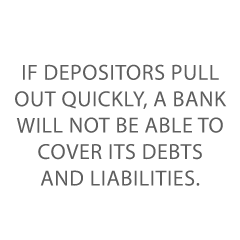Rising interest rates are making bank loans and investments lose money. The latest victim? First Republic Bank.
The demise of Silicon Valley Bank brought with it trouble for regional banks, and the First Republic was far from immune. The bank was barely treading water as higher and higher interest rates became a millstone around its proverbial neck.
And down went troubled First Republic bank.
This blog post may contain affiliate links, meaning when you click the links for some products and make a purchase, Credit Suite receives a commission at no additional cost to you.
A Disturbing Sense of Déjà Vu
We have been down this road before, with Silicon Valley Bank and Signature Bank. And you may recall that Silicon Valley Bank was the second-largest bank failure in US history (behind Washington Mutual).
But records, like pie crusts, are often broken. Now, per the New York Times, First Republic has knocked Silicon Valley Bank down to third place. Let’s hope that this is it—but it might not be.
Why Did First Republic Bank Fail?
The demise of SVB started a crisis of confidence, a feeling that more bank failures were imminent. It did not help that Signature tumbled as well, and then Credit Suisse’s story came to an ignominious end.
As inflation has risen in the United States, the Federal Reserve has raised interest rates as a means of trying to tamp down the increase in prices. However, these higher rates have had an unintended effect—they have turned winning bank investments into losing propositions.
The First Republic catered to wealthy clients who, once they caught whiffs of the bank’s troubles, yanked out their money as quickly as they could. This was a fairly smart strategy, as clients often had more than the FDIC maximum for insurance.
The clients, most likely, did not think they could count on another government bailout.
According to the Associated Press,
“Too many (First Republic) customers showed their true loyalties were to their own fears,” wrote Timothy Coffey, an analyst with Janney Montgomery Scott, in a note to investors.
However, such a statement seems a bit misplaced. After all, this was not an unfounded panic. It was, rather, a move to protect substantial assets.
Loyalty is for family, country, religion, your company, and sports teams, among others. But it’s not for banks that are barely afloat and sinking fast.
Depositors Had One Big Question to Start: Is My Money Safe at First Republic?
Well, it is now.
According to CNN Business,
JPMorgan Chase said it had acquired “the substantial majority of assets” and assumed the deposits, insured and uninsured, of First Republic from the Federal Deposit Insurance Corporation, the independent government agency that insures deposits for bank customers.
Effectively, JPMorgan Chase Bank took on the deposits, including any excess past the FDIC insurance limit.
And the Corollary Question: What Happens to my Money in First Republic Bank?
The website for FR Bank now has a letter from J P Morgan front and center. This letter notes that the New York bank has acquired the majority of the assets of FR Bank and
The letter is a model of assurance to depositors, even referring to the Morgan balance sheet as a ‘fortress’.
The takeover by this New York bank was so quick that there is still a First Republic banking app, and the website still works, even beyond the letter to depositors.
Political Reaction
President Biden on May 1, 2023 praised the deal, saying that the depositors were protected without taxpayers having to foot the bill.
Not directly, that is.
The deal, per Reuters, will cost the FDIC’s Deposit Insurance Fund a good $13 billion. That money wasn’t under the FDIC’s mattress. Even if it was indirect, taxpayers are bearing some of the brunt.
But they have likely borne their share of the bill already, at least.
How Much Did JPM Pay for First Republic Bank?
JPMorgan will pay $10.6 billion to the U.S. Federal Deposit Insurance Corp (FDIC). This is a part of a deal to take control of most of the San Francisco bank’s assets.
It doesn’t hurt that now JP Morgan Chase will get access to First Republic’s coveted wealthy client base. Although this seems like a rather expensive way to buy a list, if you ask me…
This is after eleven banks threw $30 billion at First Republic when the crisis at Silicon Valley Bank kicked off. Hence the $10.6 billion figure is probably understating the total.
 But don’t feel too bad for JPM. According to Barrons, Jamie Dimon (JPM Chase’s CEO) expects JPM to make $500 million annually from the deal.
But don’t feel too bad for JPM. According to Barrons, Jamie Dimon (JPM Chase’s CEO) expects JPM to make $500 million annually from the deal.
How Does This Affect You and Your Business?
As inflation continues to hit the country, more and more regional banks are likely to see a dropoff in their profits, much like FR Bank did. If depositors pull out quickly, a bank will not be able to cover its debts and liabilities. 
And despite how the deal with First Republic Bank and JPM has shaken out, the number of knights in shining armor, coming to the defense of depositors is not infinite.
The real question is whether the banking crisis will continue after the number of knights inevitably runs out.
Business Credit to the Rescue!
But there is a hero on the horizon—on several horizons, that is. And that is business credit.
Unlike banks and deposits, business credit isn’t going to go under, ever.
It quite simply cannot.
Even if a major purveyor of trade credit goes out of business tomorrow, there will always be companies looking to offer business credit and report positive payments to the business CRAs.
At Credit Suite, we make it our business to keep track of which companies are offering business credit, and their specific terms. When those terms change, we change our software. And our advisors update the information that they give out.
In short, we work hard to make certain that the information we provide is accurate and complete.
And, we diligently work to accommodate our customers, so if one trade credit provider stops offering trade credit (or goes out of business entirely), we make sure our customers have other options.
Why not contact us today, and find out how we can help, and how business credit isn’t subject to the same vagaries as banking—even if a fourth bank goes out of business and it’s déjà vu all over again.

